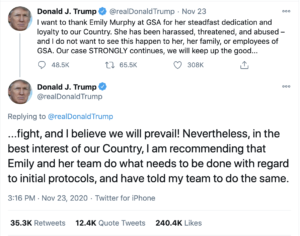Written By: Allison Stone and Christopher B. Dolan
What is ascertainment?
President-elect Joe Biden’s transition to power relied on a widely unknown acknowledgement called, “ascertainment.” Under the Presidential Transition Act of 1963 (PTA), the transition to the next presidential administration formally begins once the Administrator of the General Services Administration (GSA) ascertains the, “apparent successful candidate,” for president. But what does this mean?
Generally the GSA is the federal agency that keeps our government running, and the GSA Administrator determines when the transition to a new administration begins. To do so, pursuant to the PTA, the Administrator ascertains the apparent successful candidate following a presidential election.
What has proved to be problematic is that there is no definition in the PTA as to how an, “apparent successful candidate,” is ascertained by the Administrator. The PTA has been amended over the years, yet the ascertainment requirement has remained vague. Thus, this critical decision is at the GSA’s discretion and based on the Administrator’s reasonable judgment.
This begs the questions: What is reasonable? What should be considered? Historically, the factors that have been relied upon include news media election calls, vote counts reported by states, and the losing candidate’s concession. For the transition to begin, the Administrator signs a letter of ascertainment, which is the current administration’s acknowledgment that a candidate won the election. Only the Administrator can ascertain the winner, thus he controls when the formal transition begins.
Currently, the Administrator is Emily Murphy. She was nominated by President Trump and appointed in 2017. It was therefore, her duty to ascertain who won the 2020 election, and she held the power to decide when to initiate a transition of power.
Why does ascertainment matter?
A letter of ascertainment is the necessary step to make considerable federal funding, resources and services provided by the PTA available to the President-elect and his team, and it allows them into the federal agencies they will take over. This gives them time to organize before Inauguration Day.
Ascertainment is a routine step based on the unofficial election results and the Administrator’s decision was made once a few credible news outlets declared a winner or after a concession. Ascertainment has often been made within a few hours to a couple of days. A prompt transition is necessary so the President-elect can hit the ground running.
Although Joe Biden was widely accepted as the apparent winner on November 7, 2020, and although news outlets and states had called the election for Joe Biden, Emily Murphy did not authorize the transition for 16 days, until November 23rd. As a result, there was a delay in the dispersal of crucial resources and materials provided by the PTA to ensure a smooth transition. Until November 23rd Joe Biden’s team could not access $9.9 million to create a new administration or to expedite background checks, and they could not go into federal agencies, or obtain intelligence briefings.
What are the consequences of delaying ascertainment?
This delayed decision has put lives at risk, particularly during this COVID-19 pandemic. Transition experts opine that the 16-day delay will leave the new administration’s coronavirus response team less prepared, may hinder coordination on future economic relief, and may threaten our national security. There was a delay with ascertainment following the contested 2000 election and experts cite 9/11 as a tragic result of the delay in getting the new administration’s national security team situated. Similarly, here, the 16-day delay puts the safety and well-being of Americans in further danger and this time cannot be regained.
How do we prevent a delay in ascertainment in the future?
Emily Murphy did not authorize the transition process for 16 days, which was well-after all major media outlets and states reported an apparent winner. Notably, in her November 23rd letter, Emily Murphy does not refer to Joe Biden as the, “President-elect,” and never stated that she ascertained that Joe Biden is the “apparent successful candidate.” This is the basic language in the PTA. Instead, Emily Murphy stated, “I have determined that you may access the post-election resources and services described in [the PTA].” Her letter also states, “Please know that I came to this decision independently […] I was never directly or indirectly pressured by any Executive Branch official […] with regard to the substance or timing of my decision.”

Also, on November 23rd President Trump tweeted that, “… I am recommending that Emily and her team do what needs to be done with regard to initial protocols…” Although ascertainment is supposed to be an apolitical, independent decision by the GSA, the President’s tweet in conjunction with Emily Murphy’s letter has raised red flags and suggests that the delay was politically driven and influenced by the President.
To prevent harmful delays in the future, amendments to the PTA should be considered. Some changes should include a definition or clear criteria for determining, “the apparent successful candidate.” This will prevent Americans from relying on the unfettered discretion of one person in such a critical process in our democracy. Further, imposing penalties when an Administrator abuses the duty of ascertainment should also be considered. Finally, change must be made to ensure that ascertainment is, in fact, apolitical and independent. The 2020 election has taught us that changes to the PTA would be highly beneficial to ensure a smooth and prompt transition of power for the safety of our country.










